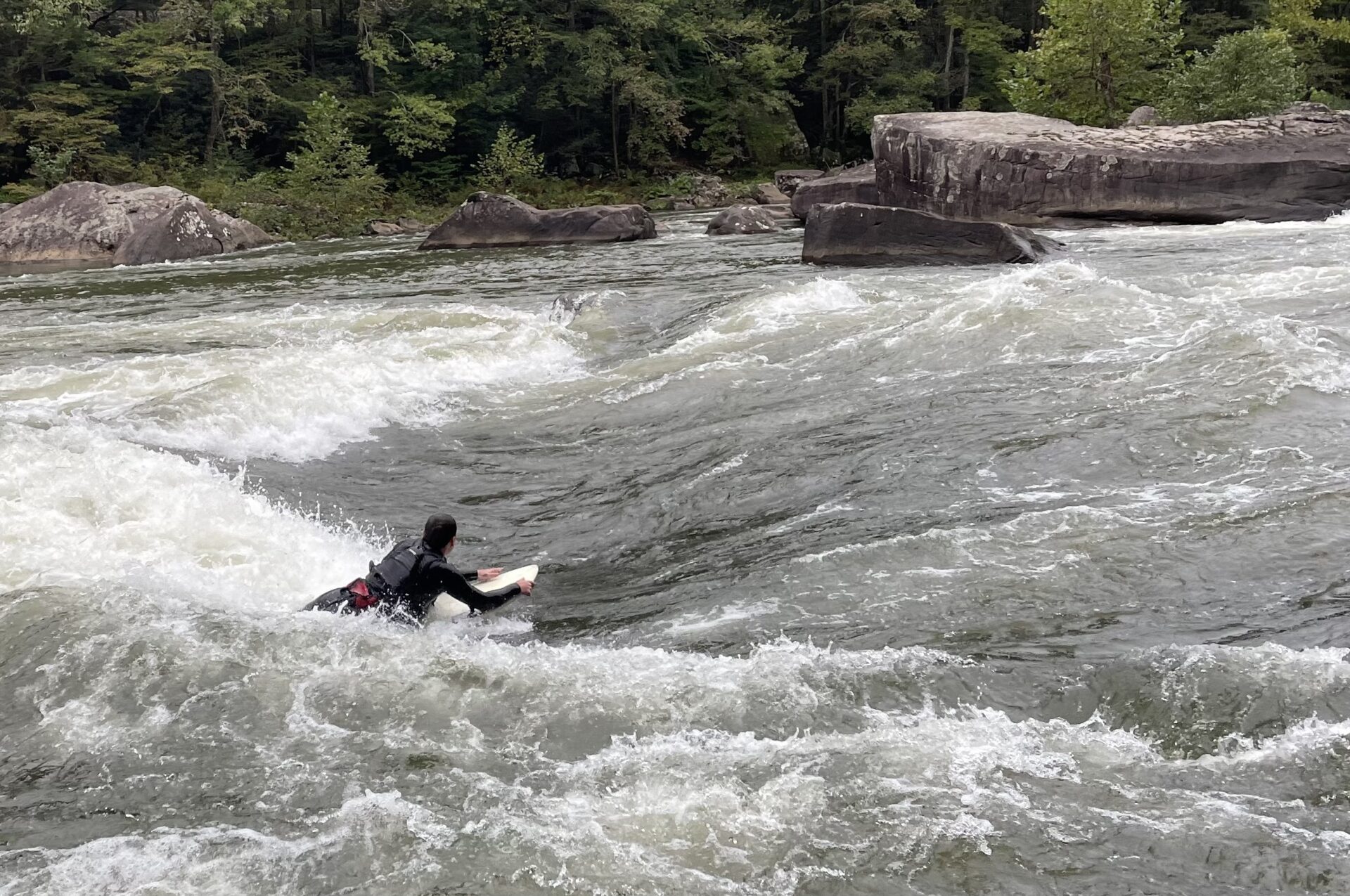It’s a crisp fall day, and the leaves are showing the early glimmers of red and yellow.
Andrew Wagner stood on a sandy beach, deep in the Appalachian mountains. He wore a wetsuit and held a surfboard. In a canyon, with a rushing river to his side, he pointed out a couple rolling waves.
“We’re below a rapid called diagonal ledges, and this has been a destination for river surfers for quite some time,” Wagner said.
The road to this wave is long, narrow and requires four wheel drive. The hike from where you can no longer drive is also long, a few miles down a railroad track. Then surfers have to paddle or swim across the river, through a class three rapid.
Wagner said the journey is worth it.
Briana Heaney/ West Virginia Public Broadcasting
“No cell service out here, but it’s gorgeous cliff walls, these beautiful sandstone cliff walls,” Wagner said.
Other surfers stood on a narrow black rock ledge, holding their surfboards. Just a few feet from the surfers’ feet, where the river cut through the canyon rock, is a large overhead wave.
“You’re looking at it. The white water is frothing. You’re frothing,” Wagner said.
To enter the wave the surfers took one big leap, holding the board to their body. As soon as they flopped into the wave, they started aggressively paddling.
“Behind you, it’s over your head, and in front of you it’s over your head,” Wagner said.
The ones that were fast enough paddlers slid into the little valley between two peaking waves. At that point they didn’t need to paddle anymore, the wave just held them there.
“So you’re down in this trough and and the water is coming to the top of the wave and breaking back down and crashing, and it’s aerated, and it’s foamy, and that’s kind of like, holds you in there,” Wagner said.
From there Wagner said surfers have to jump from their belly to their feet in one swift move. Few were able to do this, but the ones that did stood on top of their board in the classic surfer position, feet wide, arms out shoulder height.
This is surfing on the Gauley River.
Briana Heaney/ West Virginia Public Broadcasting
“River surfing, It ‘tis the season,” Wagner said.
Starting in September millions of gallons of water are released from Summersville Lake into the Gauley River to help prepare the lake for winter. It’s a great opportunity for rafters, kayakers, and surfers to enjoy rare high flows of the river.
“Lately, the scene’s been pretty cool. Like a lot of people have been getting into it,” Wagner said.
Wagner said being in the wave is the best part, but it’s also fun watching each other surf, and feeling a part of that community.
“You’re hearing the cheers of your friends, and that’s, like, one of the most exciting, awesome parts about it is, like, being out here, sharing the stoke, and people rooting for you,” Wagner said.
Wagner was at the wave with his friend Brian Bridgewater, who he introduced to river surfing. Bridgewater started off as a climber, then met some white water kayakers and got into kayaking, then through that met some river surfers, and started river surfing.
“I flopped and flailed around a whole lot my first year trying it. There’s definitely a learning curve that is pretty steep,” Wagner said.
Briana Heaney/West Virginia Public Broadcasting
Almost a decade later, he’s an experienced river surfer.
River surfing is a growing phenomenon. According to National Geographic it’s one of the fastest growing sports in landlocked regions, with powerful rivers.
In Appalachia, where there is an abundance of white water, river surfing is catching on.
It’s even got the attention of ocean surfers. Bridgewater said when he goes on vacations to the beach, surfers often ask what other beaches he surfs at.
“I’ve gone to the beach, and they’re like, Oh, where do you live? Like, where do you normally surf? And I’m like, Oh, I live in West Virginia. And then they just give you an awkward stare. That’s a landlocked state, like, where do you normally surf at? And I’m like, on the rivers. And there just flabbergasted, to say the least,” Bridgewater said.
“A couple landlocked surfers,” Wagner said while laughing.
There are other surf waves in West Virginia as well according to the West Virginia Department of Tourism, on the Gauley and New River.
Any wave on the Gauley River and New River requires expert whitewater knowledge and skills as well as safety equipment, like helmet and a PFD.
Briana Heaney/West Virginia Public Broadcasting
